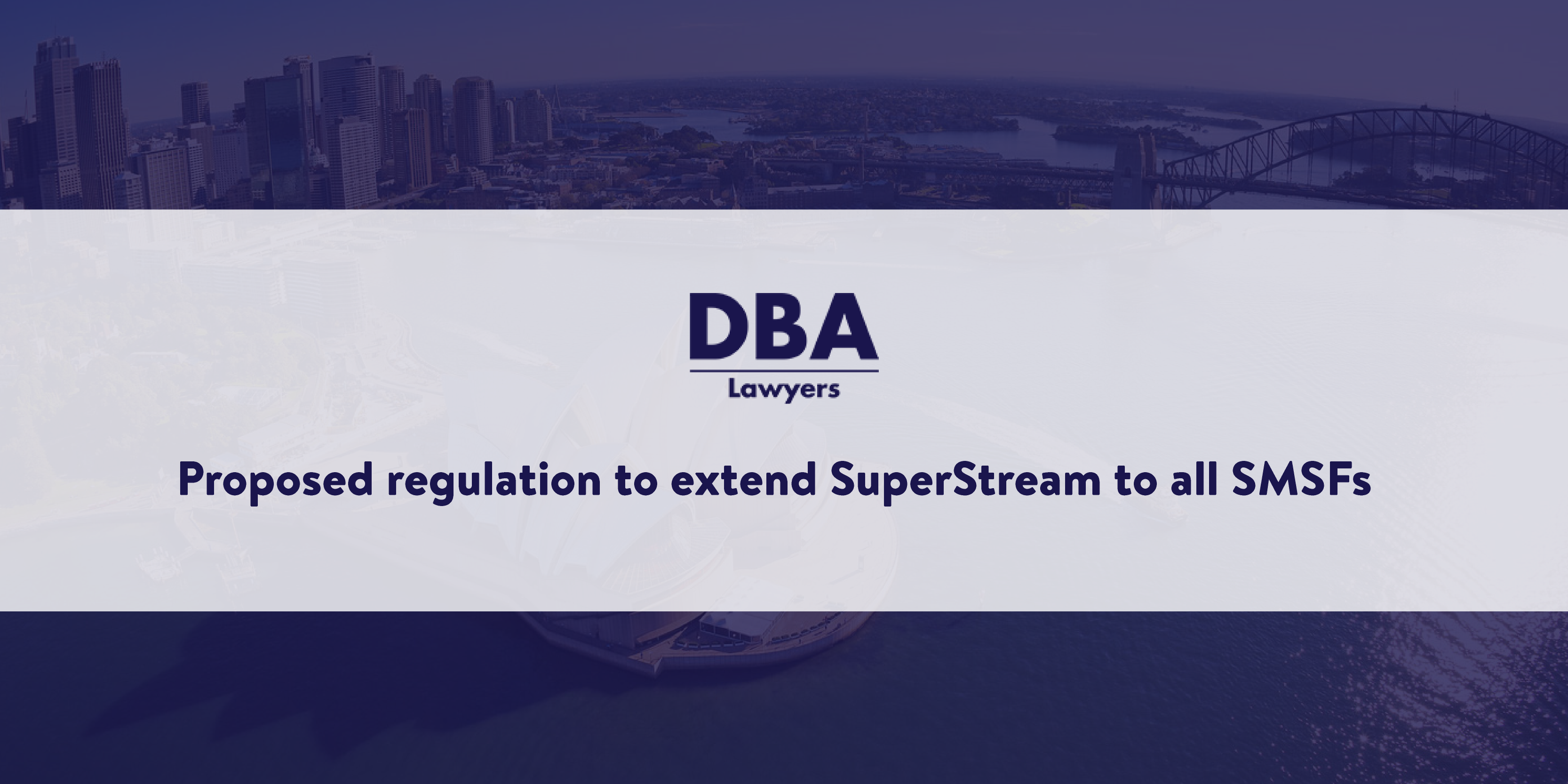
By Christian Pakpahan, Lawyer and Daniel Butler, Director, DBA Lawyers
On 17 July 2018, Treasury released exposure draft legislation which broadly extends the operation of SuperStream to cover self managed superannuation funds (‘SMSFs’). Currently SMSFs only need to be able to receive contributions and rollovers through SuperStream.
Current Legislation
Currently SMSFs are only required to be able to receive arm’s length employer contributions and large superannuation fund rollovers using SuperStream (including any relevant data/information).
Accordingly, SMSFs that do not receive arm’s length employer contributions or rollovers or transfers from large superannuation funds are currently not required to use SuperStream. This would include SMSFs that may only have contributions from related-party employers (eg, a family business) or SMSFs that receive rollover or transfers from other SMSFs.
At this point the Superannuation Industry (Supervision) Regulations 1994 (Cth) (‘SISR’) provides that, apart from SMSFs, all superannuation funds should:
- provide information to the Australian Taxation Office (‘ATO’) using SuperStream; and
- transfer payments to other superannuation funds using SuperStream.
However, the exposure draft released by Treasury proposes to extend these requirements to SMSFs.
Exposure Draft
If the exposure draft is made law SMSFs will be required to provide data/information to the ATO and make transfers or rollovers to other superannuation funds using SuperStream. If made law the amendments are proposed to apply from 30 November 2019.
Providing information to the ATO using SuperStream
SMSFs will broadly need to give the following information to the ATO:
- a unique superannuation identifier (eg, ABN);
- bank details that can receive electronic payments; and
- an internet protocol or other digital address (ie, an electronic service address (‘ESA’)) that can facilitate SuperStream communication.
An SMSF can obtain a SuperStream ESA through an SMSF message provider, SMSF administrator, tax agent, accountant or bank. The ATO provides a register of SuperStream providers on its website.
This measure will broadly enable the ATO to obtain the ESAs of all SMSFs and have more up to date data on each SMSF’s electronic records. In the media release accompanying the exposure draft, minister for revenue and financial services, Kelly O’Dwyer, broadly stated that the benefits of this would include reduced compliance costs for SMSFs by reducing current manual paper-based processes and improving the integrity of the superannuation system by increasing the ATO’s ability to verify SMSF data. This will be particularly beneficial for the ATO’s SMSF verification service, which APRA funds generally use before processing an SMSF-related rollover.
SMSF rollovers to other superannuation funds using SuperStream
Division 6.5 of Part 6 of the SISR broadly prescribes which superannuation fund rollover or transfers between superannuation funds are subject to SuperStream. If the exposure draft is made law, the general exclusion of SMSFs from the operation of division 6.5 will be removed.
If this is removed, the SISR prescribes that in regard to rollovers or transfers between superannuation funds, the transferring fund must use SuperStream regardless of whether the superannuation fund is an SMSF.
Among other things, this will require a transferring SMSF to receive a rollover/transfer request electronically, verify and validate the member’s details and rollover/transfer the relevant amount pursuant to SuperStream. Also, under SuperStream there is a requirement to broadly rollover the relevant amount no later than 3 business days after a superannuation fund receives a rollover request. This requirement initially did not apply to SMSFs, however, as SuperStream will be extended to SMSFs, it appears at this stage that SMSFs will also need to adhere to a 3 business day rollover period.
All SMSFs will need to be compliant with SuperStream
If the current exposure draft passes as law, by 30 November 2019 SMSFs will need to be compliant with SuperStream, not just in regard to receiving contributions and rollovers but also in regard to transmitting information to the ATO and in relation to rollovers and transfers.
Related articles
Prior articles on SuperStream are available here:
* * *
This article is for general information only and should not be relied upon without first seeking advice from an appropriately qualified professional.
Note: DBA Lawyers hold SMSF CPD training at venues all around Australia and online. For more details or to register, visit www.dbanetwork.com.au or call Marie on 03 9092 9400.
29 August 2018

